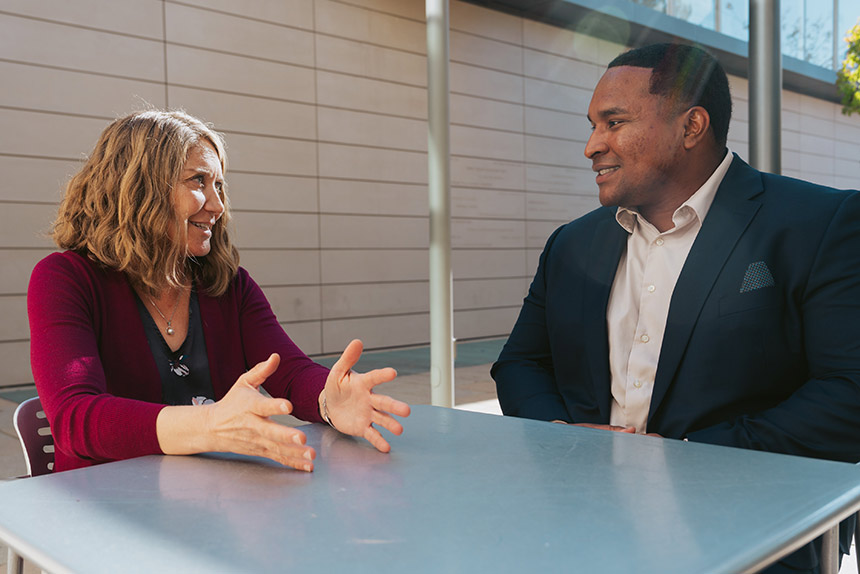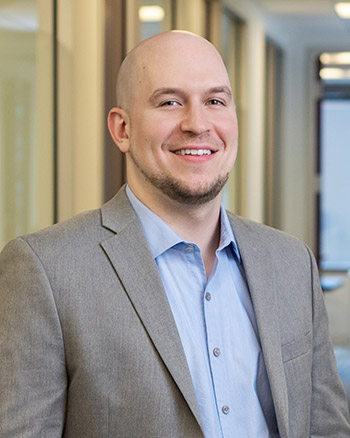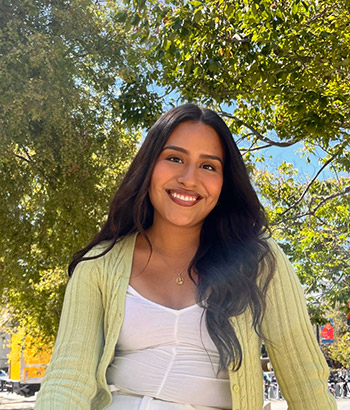
By Andrew Cohen
Academic support initiatives aim to help all students, including those from underrepresented backgrounds, adjust to their new environment. But telling data and testimonials reveal how Berkeley Law’s Academic Skills Program (ASP) empowers students not just to survive law school, but to thrive in it.
“We continually see our pre-orientation students take on leadership positions,” says Director Diana DiGennaro ’06. “This is a robust year-round program that sets up students for success.”
The evidence is overwhelming: Six of the past nine California Law Review editors in chief participated in pre-orientation, as did five of the past six Student Association at Berkeley Law co-presidents.
SABL Co-President Caleb Charles ’25 calls his time in last year’s program an incredible experience, adding that as a first-generation law student he appreciated early exposure to sound law school study techniques and fundamental skills.
“What makes this program so great is the effectiveness of its leadership and how thoughtful, organized, and tailored to student needs it is,” Charles says. “I also appreciated building community with other law students and faculty early on, for it’s the people who make Berkeley Law so special.”
The program also uses various workshops and services during the school year to build the skills essential to success in law school and practice. For 1Ls, small-group “labs” throughout their first semester are led by upperclass students who introduce case briefing, rule analysis and synthesis, outlining, and exam-writing.
Labs are also offered during the spring semester, as student tutors — often former pre-orientation participants — hold office hours, provide individual feedback on practice hypotheticals, and answer questions about law school and study strategies.
Early bonds
The week-long pre-orientation helps 40 to 45 1Ls each year. Beyond the concrete academic tools they acquire, students immediately begin forging community and building strong relationships.

“The most meaningful part of the program to me was meeting other people who had the same foundational questions and first-generation backgrounds as myself,” says Adnan Toric ’21. “There’s a special comfort in beginning law school with a group of people you can lean on. Law school is tough, but the pre-orientation program allows you to feel like you belong at Berkeley Law before classes even start.”
Toric later became an ASP tutor, an editor at two Berkeley Law journals, and directed the student-led Academic Empowerment Program. After two years clerking for a federal district court judge, he recently joined Cohen Milstein as an associate in its Philadelphia office.
During his pre-orientation, Toric recalls a professor known for being a tough cold caller conducting a mock class and demystifying the law school classroom dynamic, which made courses less intimidating when the semester actually began.
“The ASP is vital for students from non-traditional backgrounds to feel a sense of both confidence and community in law school,” Toric says. “Some of my close friends even now are people I met during the program as a first-year student and later working within it as a tutor. The program allows students to learn how to be law students, what is expected of them, and gives them a game plan to meet those expectations.
“All the better, their peers are the ones teaching them how to succeed. Who could be a better tutor than someone who just finished going through what you’re going through now? I think those are the reasons the program has been successful, aside from the wonderful guidance of faculty like Diana DiGennaro and Professor Kristen Holmquist.”
In January 2020, the program received a note about Toric from an anonymous student, which read: “I just wanted to drop off a quick thank you for your program. Before ASP I had no clue what a case brief or outline were. Many accolades to my mod’s tutor — Adnan Toric — for his infinite patience while helping me to discern the differences between holding/judgment/rule and what the heck an ‘issue’ was. His encouragement and down-to-earth advice were linchpins to my success last semester. Give the guy a raise! Sincerely, an appreciative student.”
A productive pipeline
DiGennaro regularly sees how creating a bridge for pre-orientation participants to later become tutors pays dividends for everyone involved, noting that having such a vibrant program helps set Berkeley apart from other top law schools.

Tutor and former pre-orientation member Celeste Gomez ’25 says the ASP is grounded in community values and fuels relationships centered around mutual trust and support.
“Professor DiGennaro did a great job at fostering an inclusive and safe environment during pre-orientation that allowed me to feel comfortable not knowing much about law school classes or exams” she says. “I aim to do the same during every lab.
“I also make sure to hold some space for the things students love outside of law school and try to connect with them on a more personal level. I believe that law school is about much more than learning how to read cases and take tests. It’s a grueling process that challenges us to question everything we thought we knew before, and to find ways to develop smart strategies to take care of ourselves amidst the academic pressure.”
The school’s curriculum also offers numerous courses that focus on honing skills essential to academic and professional success as well as teach the relevant substantive law, including offerings such as Advanced Legal Writing, Constitutional Law, Lawyering As Problem-Solving, and Trusts and Estates.
“The Academic Skills Program’s importance lies in its contribution to Berkeley Law’s public mission by providing students from diverse backgrounds with the necessary tools for becoming exceptional advocates who will serve the public’s interests through the practice of law.” Charles says. “It’s inspiring to see how this program has and will continue to help prepare students to make a positive impact on our society.”